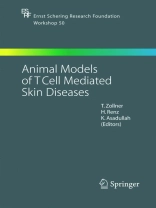Pharmaceutical companies are spending increasing amounts of money on drug discovery and development. Nevertheless, attrition rates in clinical development are still very high, and up to 90% of new compounds fail in clinical phase I – III trials, which is partially due to lack of clinical efficacy. This indicates a strong need for highly predictive in vitro and in vivo models. The ’50th International Workshop of the Ernst Schering Research Foundation’ focussed on ‘Animal Models of T Cell-Mediated Skin Diseases’. Such animal models should have impact not only on inflammatory dermatoses but also on other inflammatory disorders due to their model character. The current volume summarises recent advances in animal research that are important for anti-inflammatory drug discovery.
สารบัญ
Making Gene-Modified Mice.- High-Throughput Gene Knockouts and Phenotyping in Mice.- Modelling Gene-Environment Interactions in Th1- and Th2-Dominated Diseases of Laboratory Animals.- Animal Models of Experimental Asthma.- Models of Rheumatoid Arthritis.- Animal Models of Inflammatory Bowel Diseases.- Murine Models of Atopic Dermatitis.- Epicutaneous Sensitization with Allergens as an Atopic Dermatitis Model.- T-Cell Receptor Transgenic Models of Inflammatory Disorders: Relevance for Atopic Dermatitis?.- What Must a Model Display for Proof as a Model of Psoriasis?.- From Classical Mouse Models of Psoriasis to a Spontaneous Xenograft Model Featuring Use of AGR Mice.- The Psoriasis SCID Mouse Model: A Tool for Drug Discovery?.- Pro- and Anti-inflammatory Effects of IL-4: From Studies in Mice to Therapy of Autoimmune Diseases in Humans.- What Must a Model Display for Proof as a Model of Contact Dermatitis?.- Acute and Chronic Models of Allergic Contact Dermatitis: Advantages and Limitations.- Transgenic Mice Expressing IFN-? in the Epidermis Are a Model of Inflammatory Skin Disease and Systemic Lupus Erythematosus.












